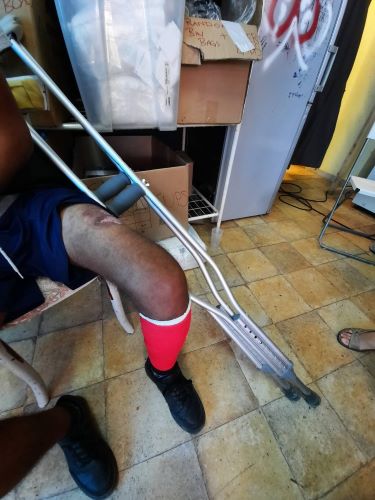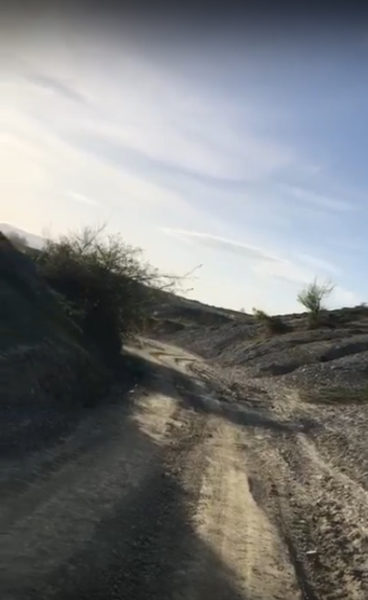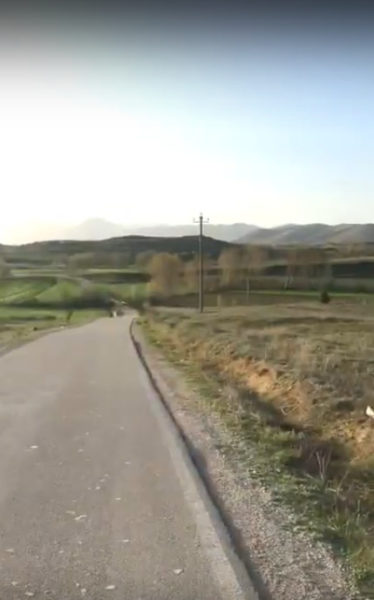The respondent is a 22-year-old man from Morocco. He was pushed back four times in a row in April 2021 from Albania to Greece. The respondent is recovering from serious injuries and was pushed back while in crutches and unable to walk by himself. He repeatedly told the officers he needed to go to the hospital, but they ignored his appeals and pushed him back.
The young man is heavily injured after having been run over by a car in the summer of 2020. The respondent reported that the accident happened when he tried to escape police officers in the port of Durrës, Albania. The police officers were chasing him in order to apprehend him and allegedly push him back. After the accident he was unconscious for approximately four days and had to undergo two surgeries. Until the time of the interview he is still walking in crutches and needs to have his dressings regularly changed and examined by doctors.

The respondent with his injured leg and the crutches.
The series of pushbacks started in April 2021, about 10 months after the accident. The respondent was in a coffee shop in Tirana when two officers, one in a blue uniform and one in plain clothes, approached him and asked if he had a passport. The respondent answered that he has no passport. The police officer explained that he would have to come to the police station to give his fingerprints. In the interview, the respondent stated:
“I already gave my fingerprint, they said no problem, we will just take your fingerprints then we will let you go.”
Later that day, instead of releasing him from the police station, a beige van arrived and the respondent was ordered to enter, together with five people from Afghanistan. There were not enough seats in the back of the car and there was only a narrow space, so he couldn’t be seated with his crutches. He was subsequently ordered to sit in the trunk of the van, which he described as having been very difficult given his injury.
Video shot out of the truck of the van
After one hour’s drive, the car arrived in a village that the respondent recognized as Bilisht, because he saw a road sign with the name written on it. There the car stopped. Two other cars arrived, which the respondent describes as old military Jeeps in green colour. Two more people-on-the-move were brought to the place. The present officers were wearing the same blue police uniforms. The seven people-on-the-move were loaded into the two Jeeps. The respondent was in one Jeep together with three people from Afghanistan. The Jeeps then drove off into different directions. The respondent’s Jeep drove for approximately 15 minutes and arrived at a place in the mountains. The respondent described the place as being in the middle of nowhere, in a kind of forest.
The respondent described that when the respondent struggled to get out of the car with his crutches, one of the officers started shouting at him: “get out of the car, get out of the car”. The officer eventually grabbed the respondent by his backpack and tried to pull him out of the car. By doing so, the backpack which contained a phone charger, painkillers (Pethidine), and other medicine with which the respondent treated himself after the accident, was destroyed. The ripped backpack and its content, including the respondent’s medicine, remained in the car.
After the pushback, the three people from Afghanistan who had been driving with him in the car decided to go back to Greece. The respondent tried to make it back to Tirana three more times. He said:
“I didn’t even think about a place to charge my phone, I was just walking by myself to go to Tirana.”
The first and the second time he was apprehended in Bilisht, the third time in Korça.
The officers who apprehended him in these following apprehensions did not speak Albanian. They asked him what languages he spoke and when he said he speaks Albanian, they replied that none of them spoke Albanian. These officers were wearing black uniforms with a green lemon-coloured insignia or arm band. They were driving new cars compared to the previously described cars driven by Albanian officers. The respondent described black and white cars, a Range Rover and a Dacia driven by the officers. The respondent referred to the officers as “NATO”, a common misunderstanding referring to Frontex officers or foreign officers deployed based on bilateral agreements (in certain locations). Based on previous testimonies and the evidence we have collected, his account likely refers to Frontex officers, deployed in Albania in Frontex operational areas.
In all three attempts, the alleged Frontex officers apprehended him and then waited for the Albanian officers in the blue uniform and with the old military Jeep to arrive. The Albanian officers then brought him back to the border. The respondent said that in the three following pushbacks the uniforms of the officers that apprehended him were the same, but the individual officers were different each time.
The respondent said he knew he was not allowed to ask for asylum. However, he asked to be brought to a hospital each time to both the Albanian and the Frontex officers. According to the respondent, the officers replied that they were close to a hospital and would bring him, but then they just pushed him back again in the middle of nowhere.


The places where the subsequent pushbacks happened.
After the fourth pushback in total, he said:
“I was really injured and so tired so I just went back to Greece and I started walking from the border until Neapoli.”
